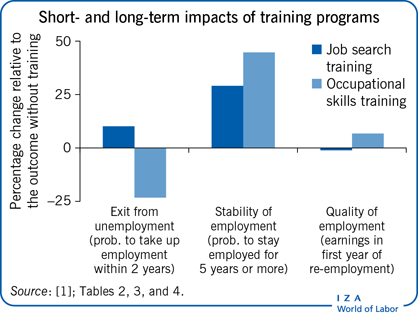Elevator pitch
Time plays an important role in both the design and interpretation of evaluation studies of training programs. While the start and duration of a training program are closely linked to the evolution of job opportunities, the impact of training programs in the short and longer term changes over time. Neglecting these “dynamics” could lead to an unduly negative assessment of the effects of certain training schemes. Therefore, a better understanding of the dynamic relationship between different types of training and their respective labor market outcomes is essential for a better design and interpretation of evaluation studies.
Key findings
Pros
For improving the understanding of how training programs work, dynamic evaluation approaches that consider changes and impacts of training programs over time are useful.
Job search training is a low-cost intervention relative to other active labor market policies.
Job search training reduces the duration of unemployment for the individual.
Occupational skills training has positive long-term effects on employment stability and earnings, which can persist over many years.
Cons
The dynamics and impacts of training participation may be misrepresented in static evaluation approaches, which could underestimate training impacts.
Job search training has no strong long-term effects on employment and earnings.
Occupational skills training ranks among the most expensive active labor market programs.
Occupational skills training initially prolongs unemployment.
